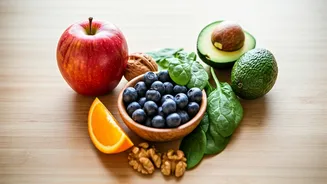Understanding Heart Health
Maintaining optimal heart health involves more than just medications; it also encompasses adopting a lifestyle that supports cardiovascular well-being.
Diet plays a pivotal role in this. Certain foods can either benefit or harm the heart's function. Foods high in saturated and trans fats contribute to elevated cholesterol levels, increasing the risk of blockages in the arteries. On the other hand, a diet rich in fruits, vegetables, whole grains, and lean proteins helps lower bad cholesterol (LDL), increase good cholesterol (HDL), and reduce the risk of heart disease. Prioritizing foods that promote healthy blood flow and reduce inflammation is key to supporting a strong cardiovascular system. Regular exercise, stress management, and avoiding smoking also complement the dietary choices to create a holistic approach to heart health.
Oats for Cholesterol
Oats, a breakfast staple, are packed with soluble fiber, particularly beta-glucan. This fiber is key to helping lower cholesterol levels. When consumed, beta-glucan forms a gel that binds with cholesterol-rich bile acids in the digestive system, preventing their absorption. This process helps your body excrete these acids and, in turn, reduces LDL cholesterol. Regular consumption of oats has been shown to reduce total and LDL cholesterol levels by 5-10%. Incorporating oats into your diet is simple: enjoy oatmeal, add oats to smoothies, or use oat flour in baking. Aim for a serving of at least 3 grams of soluble fiber per day to maximize the benefits. Remember, combining oats with other heart-healthy foods, such as fruits and nuts, can further enhance their effects on heart health. Choosing whole oats over instant or flavored varieties ensures you get the most fiber and nutrients.
Beans, the Heart Helper
Beans, including kidney beans, navy beans, and lentils, are excellent sources of soluble fiber, similar to oats, that aid in lowering cholesterol. They bind with cholesterol in the digestive tract, preventing absorption and promoting excretion. Beans are also rich in protein and low in fat, making them a heart-friendly addition to your meals. Moreover, beans have a low glycemic index, which helps regulate blood sugar levels, indirectly supporting heart health. Studies have indicated that consuming beans regularly can contribute to significant reductions in LDL cholesterol. To include beans in your diet, add them to soups, salads, or stews, or use them as a meat substitute in tacos and burritos. Aim for at least a half-cup serving of beans daily to leverage their cholesterol-lowering benefits. Canned beans are convenient, but always rinse them to reduce sodium content before use.
Avocados: Healthy Fats
Avocados are known for their monounsaturated fats, which are beneficial for heart health. These fats can help lower LDL cholesterol while increasing HDL cholesterol. Avocados are also a good source of fiber, which helps bind with cholesterol, preventing its absorption. Additionally, avocados contain plant sterols, which can reduce cholesterol absorption in the gut. The healthy fats and nutrients in avocados support overall cardiovascular well-being. Regular avocado consumption is linked to lower levels of bad cholesterol and a reduced risk of heart disease. Incorporate avocados into your meals by adding them to salads, spreading them on toast, or using them in smoothies. A quarter to half an avocado daily provides a significant dose of heart-healthy fats. Remember to moderate your intake due to the calorie density of avocados.
Nuts for Goodness
Nuts, particularly almonds, walnuts, and pecans, are rich in healthy fats, fiber, and plant sterols, which contribute to heart health. They can help lower LDL cholesterol and improve overall cholesterol profiles. These nuts are also packed with antioxidants, which combat inflammation and oxidative stress, both of which are risk factors for heart disease. Studies suggest that regularly consuming nuts is associated with a reduced risk of heart-related issues. A handful of nuts daily can be a beneficial addition to your diet. Enjoy them as a snack, add them to your oatmeal or salads, or use them in baked goods. However, be mindful of portion sizes due to the high-calorie content of nuts. Opt for unsalted varieties to limit sodium intake.
Fatty Fish Power
Fatty fish, such as salmon, mackerel, and sardines, are abundant in omega-3 fatty acids, which are crucial for heart health. Omega-3s help reduce triglycerides, lower blood pressure, and decrease the risk of blood clots. They also have anti-inflammatory properties, further contributing to cardiovascular well-being. Regular consumption of fatty fish has been linked to a reduced risk of heart disease and stroke. Aim to eat at least two servings of fatty fish per week to obtain the recommended amount of omega-3 fatty acids. You can grill, bake, or pan-fry these fish. Adding them to salads or incorporating them into fish tacos are great options. If you dislike fish, consider a fish oil supplement, ensuring you consult with a healthcare professional first.
Olive Oil's Magic
Olive oil, particularly extra virgin olive oil, is rich in monounsaturated fats and antioxidants, which are vital for heart health. It can help lower LDL cholesterol and increase HDL cholesterol. The antioxidants in olive oil also help protect against oxidative stress, reducing the risk of heart disease. Regular consumption of olive oil is associated with improved cardiovascular health and a reduced risk of heart-related events. Use olive oil in cooking, as a salad dressing, or to drizzle over vegetables and other dishes. When cooking, opt for extra virgin olive oil for its rich flavor and high antioxidant content. Always use olive oil in moderation as it is calorie-dense. Look for cold-pressed, extra virgin olive oil to maximize its health benefits.





















